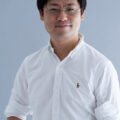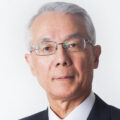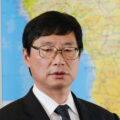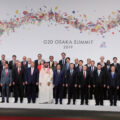Development cooperation that respects ownership
Japan is a non-Western country, which has modernized earliest among others, and Japan’s own experiences of modernization serve as a good model of development for developing countries. “Japanese style” development cooperation implemented in Africa can propose a new idea of development.
—— In August, the Seventh Tokyo International Conference on African Development (TICAD7) will be held in Yokohama for the first time in three years.
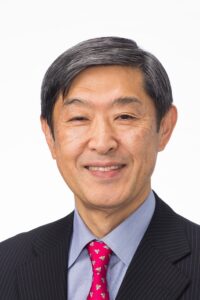
Kitaoka Shinichi, President, Japan International Cooperation Agency (JICA)
Kitaoka Shinichi: The previous TICAD VI (2016) in Nairobi, Kenya, was significant to have it for the first time in Africa. It was also my first time participating in the conference. When I look back on the three years’ progress since then, I feel that more business-minded leaders are advancing their ambitious reforms for the sake of their countries’ development without relying on natural resources and single products. Today, we can find more countries are doing their best, regardless of the size of their countries.
Most crucial for the success of development cooperation is the partner country’s ownership. I think the primary significance of holding TICAD VI in Nairobi lies in the fact that it promoted ownership by African countries. African countries themselves should lead their own development, and all we can do is to help them. What developing countries should do is not ask the international community, “What will you do for us?” but rather say, “We want to do this. Please help us to do it.” In this sense, it is a welcome change that many countries came to show their ownership and I hope for the coming Yokohama conference to further encourage that.
—— Which countries should we keep an eye on when it comes to ownership?
Kitaoka: Among the countries with a close relationship with JICA, I’d say Rwanda and Senegal, for example. Rwanda suffered a tragedy where more than 10% of the population was massacred in 1994, so the priority was to avoid conflict and to promote reconciliation. H.E. President Kagame has engaged in this difficult task, and is also working on stabilizing public order, improving national health, hygiene, and education, and building a business environment. Since they focus on IT industry, I think some parts of Rwanda’s IT environment are more advanced than in Japan.
I visited Senegal three years ago, ahead of TICAD VI. I was impressed how Senegal was developing with respect for each other and teamwork with each other, which is quite similar to Japan. Another thing I felt in Senegal was that there existed a strong sense of fellowship among the people there. Another good example in West Africa is Benin, where the people are working with strong ownership despite limited territory.
—— The Kagame administration in Rwanda has been criticized as dictatorial.
Kitaoka: I’m aware that the Kagame administration has been criticized in that way. We all understand that democratization and fundamental human rights are of utmost importance. However, it would not be desirable if these were imposed from outside without taking into account the respective situation in each country. I believe the international community should persistently promote them as medium- to long-term work.
—— While there are small countries that show signs of development, there are also large countries rich in natural resources that are in difficulties.
Kitaoka: The Democratic Republic of the Congo (DRC) is six times larger than Japan, has a population of more than 80 million. The DRC is also rich in natural resources such as copper, gold and diamonds, and has the world’s largest reserves of rare metals like cobalt that is indispensable for making lithium cells and tantalum used in smartphones. Even so, per capita national income is $460 and it is one of the world’s poorest countries with constant domestic political antagonism. When a country is vast and its population is large, ethnic relations tend to become complex and the distribution of profits from the natural resources tends to trigger conflicts. They have a very weak unity as a country and many people suffer from domestic division. I just mentioned the sense of fellowship in Senegal, and the size of the country makes people feel easier about achieving national unity. The population of Senegal is about 15 million and its’ size of national land area is about half of Japan, while the population of Rwanda is about 12 million and it’s not even 10% of the size of Japan. In many African countries like the DRC, traffic infrastructure is so underdeveloped that travel within a country, not to speak of cross-border transport, takes an enormous amount of time. In these circumstances, it would not be easy to feel a full sense of unity or to live together peacefully without conflict. It is rare for a country with a population of more than 100 million to have such a sense of unity as Japan.
—— Different approaches to assistance should be applied to different countries.
Kitaoka: There is not just one path to development. Some countries are developing in a relatively smooth manner and others are wandering back and forth between conflict and peace. Situations differ for all 54 African countries. The international community needs to understand this point more deeply.
Advancing National Unity in South Sudan
—— In this sense, South Sudan, where Japan is actively engaged, also continues to seesaw widely.
Kitaoka: In July 2016, there were violent clashes between government and anti-government forces in the capital, Juba, despite the peace agreement of 2015. JICA had no choice but to evacuate all Japanese staff from the country. However, we decided to post of Japanese staff again after two years in August 2018. I also visited South Sudan in January 2019 and had talks with President H.E. Salva Kiir and other key government officials. They expressed a strong expectation that they would complete construction projects, which are funded by Japanese grant aid and contracted out to Japanese companies, such as the New Nile Bridge and the water supply system in Juba, as quickly as possible.
The New Nile Bridge is known locally as the “Freedom Bridge.” Much of the limited infrastructure in South Sudan has been destroyed in conflicts, and the only bridge across the Nile River has severely deteriorated. As the Nile River splits the country into east and west, the limited capacity of the existing bridge causes serious logistical troubles. When the new bridge construction is completed, it will become a part of the international corridor to Uganda and Kenya for a smoother logistics system and economic vitalization. The New Nile Bridge construction is a symbolic Japanese cooperation project for reconstruction of South Sudan. Although the construction had to be suspended for more than two years due to the instability from July 2016, the work was finally resumed in May 2019 after several months of preparation on the ground.
—— Promoting national reconciliation is also important.
Kitaoka: We have been working with the government of South Sudan to organize “National Unity Day,” a nationwide sports festival held since 2016, as an initiative for national reconciliation. I also participated in the fourth festival in January 2019, where about 300 youths gathered from 12 regions nationwide. Sports foster respect for rivals and result in “no side” after the game ends. As the ancient Olympic Games were born in Greece to suspend wars, it is easy to understand that sports and peace have a strong connection. As South Sudan has repeatedly suffered from ethnic antagonism over many years, I hope that this sports festival will develop further and lead to union of the people in the country. We realize that South Sudan has come to have more trust in Japan through these cooperation programs, which is envisaged in JICA’s vision “leading the world with trust.”
Potential of Small Business
—— The role of business in development has been garnering attention in recent years. African countries are also expecting launches and investments from Japanese companies.
Kitaoka: There’s a large number of Japanese small- and medium-sized enterprises (SMEs) with unique technologies that can solve a variety of challenges in developing countries. JICA is facilitating the business expansion of these SMEs in developing countries. I’ll introduce one good example, SUNTECH Co., Ltd. in Kagawa Prefecture. They plan to set up and demonstrate a pilot plant in Morocco, one of the world’s major producers of olives, to spread the use of “oil temperature decompression drying machines.” This equipment can produce fuel, fodder, and fertilizer from olive oil expression cake and add value to these products. The Moroccan government plans to establish factories to recycle the olive oil expression cake across the country, and it’s expected that “oil temperature decompression drying machines” can be sold to those factories. Furthermore, it’s expected that they can also expand to the markets of the Mediterranean countries from their base in Morocco. When I visited SUNTECH head office and its factory in Kagawa in May 2019, I was deeply impressed by the pioneering spirit of this company despite the limited number of staff (less than fifty) working there.
—— Yet I suspect there are also hurdles that cannot be conquered with spirit alone.
Kitaoka: It’s true that it would be a bit difficult for SMEs to expand their business abroad without experience and personal connections there. SUNTECH has also built a plant in Myanmar besides the Morocco project, and provided the local staff with an opportunity to take part in training in Kagawa. Furthermore, they offer internships to African students who come to Japan under the ABE Initiative. When I visited the company, I saw staff members from different countries working there. I believe it is very important to work with good local staff and partners who know target countries much more deeply than we do.
Here, I want to draw your attention to those who came to study in Japan under the ABE Initiative.
—— I understand the ABE Initiative is a program that started at TICAD V (2013).
Kitaoka: The official name of the program is the African Business Education Initiative for Youth. It offers scholarships to Japanese graduate schools as well as opportunities for internships at Japanese companies to 1,000 African youths over five years. When I was the president of the International University of Japan, we welcomed tens of ABE initiative fellows. The principal aim is to grow young African leaders for the African private, public, and education sectors. I’m hoping that the graduates will contribute to creating business partnerships between their home countries and Japan as business leaders or government officials.
—— I think African countries expect major companies to expand to Africa…
Kitaoka: Even if a government issued a command, it would never happen that large-sized private companies would automatically expand their businesses to Africa. But some prominent Japanese companies have already expanded their businesses to Africa, and we should put emphasis on such good practices and replicate them one-by-one to achieve fruitful results.
Moreover, we can realize many things through small initiatives. In Ethiopia and some other countries, JICA facilitates community development through encouraging local small businesses utilizing local products in villages around big cities. This is a project originating from the “One Village One Product” movement of Japan. Women play a central role in these villages, even at a small scale, as they engage in everything from production to sales while their husbands are working in the city. This activity enhances sustainable local production systems and, most importantly, provides women with an opportunity to have a cash income. The women become richer and freer. This could vitalize communities. Even though each instance is small, it is greatly meaningful to create many virtuous cycles.
Primary Education Supported by the Communities
—— I can see that locally based activities are important.
Kitaoka: In particular, Japan focuses on education and healthcare. They are critically important in terms of human security. For example, Egyptian President H.E. Abdel-Fattah El-Sisi recently proposed to me a vision of building 200 Japanese-style elementary schools. When I told him that in Japan, children do the cleaning in the classroom by themselves, he responded by saying, “That’s what I want Egyptian students to do.” Now 35 Egypt-Japan Schools (EJS) have been started as a trial, and it seems to be going well.
In this trial, Egypt has reached out well over the critical issue of education in Africa. Education systems in foreign countries often focus on elite education, or higher education, which are directly linked to the issues of social status and economic inequalities. However, in Japan, it is natural for all students to clean the floors and toilets by themselves. Such Japanese-style education that treats all students equally could be ground-breaking in African countries.
—— JICA actively supports primary education.
Kitaoka: In the Sub-Saharan Africa region, we have been promoting the “School for All” programs since 2004. Good school management requires cooperation and collaboration by and among teachers, parents, and also the local community, to complement efforts by local authorities. When community leaders decide to take ownership and support a school, this can promote and maintain good conditions for their “own” school, and for their children as well as all the members of the community. This initiative started in Niger in West Africa and has spread to neighboring countries like Senegal, Burkina Faso, and also jumped to Madagascar in Southern Africa.
If we go one step further and start providing school meals, the impact will be even greater. Children go to school so that they can eat. If they don’t go to school, children in a poor family are obliged to work and lose their chance to be educated. School meals also have positive impacts on children’s health. If the ingredients are sourced locally, it even generates income for farmers. It would be ideal to create virtuous cycles like this.
—— Teacher training is also important.
Kitaoka: That’s correct. Teacher quality matters. Not all teachers have a clear understanding of what is in textbooks. As with the case of a teacher training school in Malawi, many Japan Overseas Cooperation Volunteers (JOCV) give advice to teachers on the ground. In this way, going into the classrooms and patiently doing trial and error together on an equal footing characterizes Japanese cooperation.
—— The development of primary education reminds me of the emergence of modern Japan.
Kitaoka: Japan put energy into education at elementary schools in the Meiji period with support from communities. Kaichi School in Matsumoto City, Nagano Prefecture, is one of the good examples. The community raised funds to construct a modernized school building by selling precious trees cut down from their communal forest. It still remains as it was built to this day. Also, when it comes to teacher training, Japan created teachers’ schools that waived tuition fees for students who demonstrated academic excellence but could not afford to go to university due to economic reasons. In this way, many high-quality teachers were posted to local schools all across Japan. The “One Village One Product” movement and the “School for All” programs might not seem a smart way of doing business. But looking at the experiences of modern Japan, I believe this might be the most effective method in the end.
—— What is needed for further development?
Kitaoka: Interest in Sustainable Development Goals (SDGs) is growing worldwide. In particular, ESG investment, meaning investments that prioritize or select companies that care about environmental, social, and governance criteria, is growing in financial markets and enables money to be invested in socially meaningful business. I hope to connect these opportunities with business in Africa. As an example, Saraya Co. Ltd., a chemical product manufacturer of soaps and other cleaning agents and disinfectants, produces and sells alcohol hand sanitizers in Uganda and Kenya. JICA cooperated with them when they expanded their business in Africa. Their concept that, “hygiene starts with hand washing” is easy to understand, and their business contributes to protecting people’s everyday health from infections. It is a meaningful business. They opened their first office in Uganda in 2011 and started out with a deficit, but I’ve been told they recently recovered their initial losses and are now keeping in balance. I hope to see more social business cases like this becoming financially profitable and sustainable.
Japan Should Become a Center for Development Studies
—— Meanwhile, in the field of higher education, you have started the JICA Development Studies Program (JICA-DSP).
Kitaoka: It is broadly recognized that Britain is the center for development studies in the world. Britain was a great power that had colonies across the world in the past, but it is questionable whether Britain’s experiences as a colonial power can be a useful reference for most developing countries today. Japan’s modernization experience as a non-Western country, and Japanese ODA‘s experience of having achieved fruitful outcomes in East Asia, as well as our experience of failure, are worthwhile studies for developing countries. I am sure that Japan should become a center for development studies.
That is why we created the JICA Development Studies Program, inviting future leaders of developing countries to Japanese graduate schools. The program provides them with opportunities to learn about Japan’s experiences of modernization and development differentiated from those of the Western countries, as well as our experiences and knowledge as a post-war donor country.
—— How do they learn in this education program?
Kitaoka: JICA operates JICA-DSP in collaboration with Japanese universities. The standard course leads to a master’s degree in two years. All classes are taught in English. More concretely, it is designed on the basis of existing degree programs of collaborating universities in four areas; Politics / Law, Economics, Social Development, and Science, Technology and Innovation. In addition, JICA-DSP also provides opportunities to study about experiences and knowledge of Japan’s development, as well as its development cooperation with developing countries. This makes up about 10%–20% of all the programs.
Also, we organize focused, short-term joint programs to introduce Japan’s politics, governance, economy and society as a way to promote understanding of Japan’s experiences of development. Moreover, to give opportunities to more students and fellows from developing countries, we deliver a series of lectures titled “Seven Chapters on Japan’s Modernization,” that is jointly created with the Open University of Japan (OUJ), through TV/Radio channels. I have also lectured on the topic “Meiji Restoration: Start of Full-Scale Modernization,” the details of which are introduced by Dr. Shiratori Junichiro, Associate Professor of OUJ, in Gaiko Vol. 54.
—— What outcomes are you hoping for?
Kitaoka: Firstly, the aim is for excellent government officials from developing countries to acquire a systematic understanding of Japan’s development experience, and to use effectively what they have learned in Japan for the development of their home country. Secondly, I expect that those who have studied in Japan will become top leaders in their home country, who have deep knowledge and understanding of Japan, and thereby to strengthen the relationship between the two countries in the medium- and long-term. Thirdly, I hope we can contribute to growing global leaders as well as revitalizing Japanese domestic local areas and universities by working together with energetic and knowledgeable future leaders from abroad, as an indirect impact.
In Order to Stay Clear of “Debt-Trap Diplomacy”
—— China has a major influence in African development.
Kitaoka: What we first need to remember is that China is the forerunner in Africa. China has been supporting African countries since the 1950s, when they were still economically struggling, under the slogan “Unity and Solidarity of the Non-Aligned Countries.” A symbolic project for Africa-China solidarity in that period was the construction of the TAZARA Railway between Tanzania and Zambia. With some exceptional preceding cases, Japan started real and deep engagement with Sub-Saharan Africa in the 1990’s, as shown by the holding of the first TICAD in 1993. At TICAD VI in 2016, the Japanese government announced the “Free and Open Indo-Pacific” vision, which indicates how Japan puts great importance on Africa now. So, Japan is a latecomer compared to China. Moreover, while about 1 million Chinese are living on the African continent, only about 8,000 Japanese are living there. Of course, we can see some criticisms coming from the international community, saying that China’s goal in the African continent is to monopolize natural resources, so all they are doing is to construct gigantic buildings to win over those in power. However, China is actually modifying their approach in response to those criticisms.
Many concerns still remain, one of which is the so-called debt-trap diplomacy. The G20 Osaka Leaders’ Declaration also referred to considering sustainability of public finances, environmental and social impacts, and financial soundness in the context of infrastructure development. This requires formulating new investment rules among financiers including China and other new donors.
Yet at the same time, there also exist challenges on the borrowers’ side when they accept huge sums of money with high interest rates. The borrowers’ capacity to manage their public finances needs to be improved. In this context, it would be effective to dispatch such technical experts as a fiscal management advisor to government. Mr. Hattori Masaya, who worked as the governor of the Central Bank of Rwanda in the 1960s, fulfilled exactly that mission. Afterward, JICA has worked with several countries in improving their capacity to manage their public finances. This could be a joint effort at capacity building between Africa and Japan.
Keywords
- Harada Maha
- Kitaoka Shinichi
- Shinichi Kitaoka
- JICA
- TICAD
- National Unity Day
- South Sudan
- Senegal
- Rwanda
- Democratic Republic of the Congo
- Morocco
- Egypt
- Egypt-Japan Schools
- ABE Initiative
- SMEs
- human resources training
- JICA Development Studies Program
